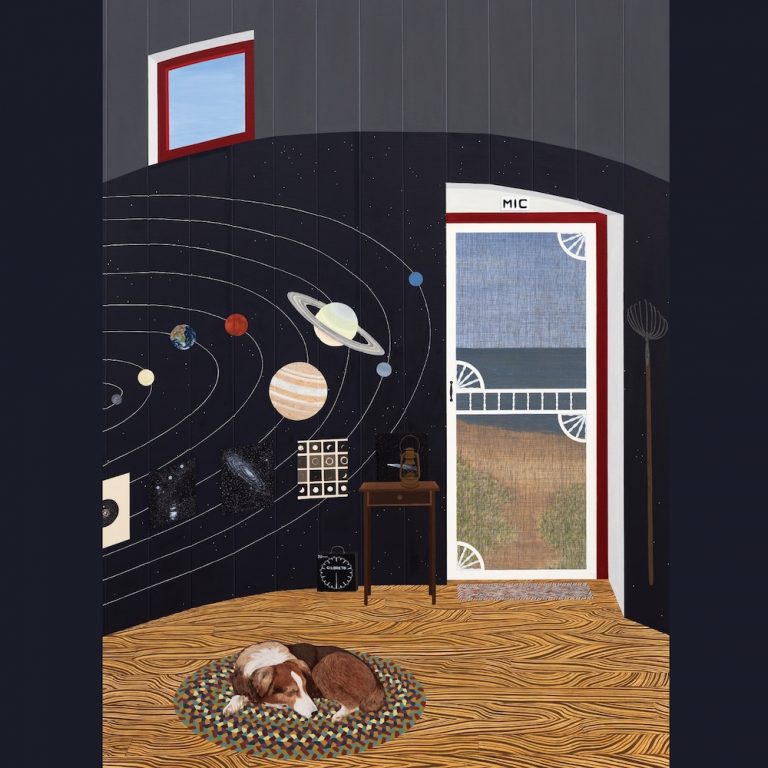When harpist and composer Mary Lattimore sits down to create a song, she only really has, at most, an emotional or thematic undercurrent in mind. Perhaps a stray melody here or there has been perfected prior to hitting record, but once the red light goes on, Lattimore’s fingers start plucking, but simultaneously they are twirling knobs and hitting buttons, interweaving electronics and effects live in the moment.
This type of technology-meets-classical approach has long been Lattimore’s calling card, and her improvisational methods allow for a real sense of unknowing, of unpredictability. Over the last decade she has been contributing strong session work for a multitude of artists that veered closer to the traditional, but it’s in her solo work and improvisational projects that her anything-could-happen style has been developed.
Now we find her casting her wild spells again on new album Silver Ladders. Produced and recorded by Slowdive’s Neil Halstead, this is the first record released as a Lattimore solo project that leans more toward the collaborative, as she has previously recorded and done everything herself in her own spaces. This welcoming of a production partner (and occasional songwriting and instrumental partner) does nothing, though, to dull the shine of the magic Lattimore can create.
The first thing we hear as the opening track “Pine Trees” comes to life is a simple, lovely, unadorned harp progression. Slowly, though, an encroaching hum grows in the background like a yawning cavern, while the harp subtly begins to echo and duplicate. It’s not unlike what cellist Zoe Keating does with her instrument: displaying a full comprehension of the limits of the instrument, and then a gentle pushing past it, into new territory. After years of playing classical music, Lattimore’s desire to start blending in improvisation, pedals and electronics has paid off in spades, and “Pine Trees” is a wonderful introduction to the world she creates here on Silver Ladders.
The title track continues in a similar vein, though comes off much sparer at first. High, sustained plucks eventually give way to glistening, vibrating echoes of sound, like the clouds finally parting and letting the sun peek through. First single “Sometimes He’s in My Dreams” has a bit of a lullaby-in-a-horror movie vibe, with the gentlest of unease trickling underneath, the synth crests and Halstead’s guitar coming in on the second half to provide some beautiful depth.
These shorter songs, all under four minutes, are interspersed with longer cuts, like the 10-minute “Til a Mermaid Drags You Under”. The song starts with a simple four-note progression, then Lattimore slowly complicates it, adding in deeper plucks and guitar strums, a growing bassy layer arising underneath. Eventually, some buzzing metallic strings and Windy & Carl-like guitar stabs drop in, along with some high, gently pitch-shifted harp. It’s a bit reminiscent of the way her close friend and contemporary Julianna Barwick crafts her evolving, linear soundscapes, the tension rising with each new addition. The spell of the song warrants its long runtime, washing over you with its many intermingling layers.
Other songs have their own intriguing ideas at work, too, such as the warbling synths that form the foundation of “Chop on the Climbout”, which create a nice change-up in Lattimore’s instrumental palette. It sounds almost like something out of an episode of Twin Peaks, as its high harps start to fall like mist on the winding electronics. Sometimes, the album does feel a bit stuck in its way, like on “Don’t Look”, which is indisputably beautiful, but it feels a bit too similar to past moments on the record, as does the closer “Thirty Tulips”, though it does have a really lovely organ drone complimenting the harp. It fades off like a gorgeous, muted sunset.
Lattimore impresses again with Silver Ladders. While it isn’t horribly different from previous solo record Hundreds of Days, it does feel, overall, like her grasp on her tools is firmer, and her ideas feel a bit more refined and distilled here, like she’s reached a purer version of her vision. The subtle additions of instrumentation, as well as the guitars from Halstead, really help embolden the record. While it may lack a song as singularly and angelically beautiful as “Hello From the Edge of Earth”, Silver Ladders makes up for it by giving us seven lovely, gorgeous soundscapes to get lost in, guided by – but not dominated by – her trusty harp.

